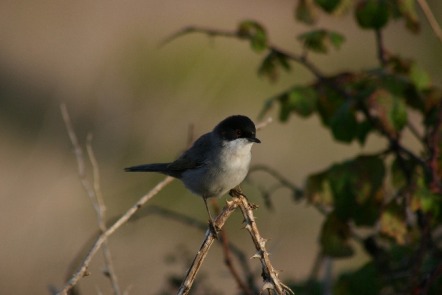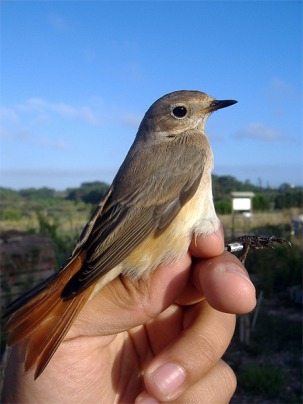Birds

Sardinian Warbler, César Capinha
Concerning the avifauna, the ecological relevance of Paul lies in the fact that it is an important stopover site on migration, for breeding and wintering seasons of several species of marsh birds. We can stand out some nesting species, as the Little bittern, the Purple Heron, the Reed Warbler and the Great Reed Warbler, and more recently the Purple Gallinule.
During migration we can find some bird species using Paul just for a couple of days to rest and feed themselves. We can watch Bluethroat, Yellow Wagtails (roosting), Sedge Warbler, the rare Aquatic Warbler and other Warbler species on the rushes nearby.
In winter you can find several duck species, such as the Mallard, Shoveler and Teal. Grey Herons, Cormorants and Marsh Harrier are the easiest species to find. If you get lucky, you may also watch a Bittern or a Spotted crake. On passerines you can watch Reed Buntings, Chiffchaffs, Sardinian Warbers and several species of Tits.
Occasionally you can see a Black-winged-kite or an Osprey flying over!
During migration we can find some bird species using Paul just for a couple of days to rest and feed themselves. We can watch Bluethroat, Yellow Wagtails (roosting), Sedge Warbler, the rare Aquatic Warbler and other Warbler species on the rushes nearby.
In winter you can find several duck species, such as the Mallard, Shoveler and Teal. Grey Herons, Cormorants and Marsh Harrier are the easiest species to find. If you get lucky, you may also watch a Bittern or a Spotted crake. On passerines you can watch Reed Buntings, Chiffchaffs, Sardinian Warbers and several species of Tits.
Occasionally you can see a Black-winged-kite or an Osprey flying over!

Redstart, Helder Cardoso
The end of the summer is, without doubt, the best period to visit Paul, regarding the higher number of bird species and the water level, at its minimal, making it very easy to watch some Waders looking for food in the exposed muds.
There is a bird ringing station on Paul de Tornada, working all year round, with one ringing session every week. During migration period we intensify the work, by ringing daily, from 15th July to 15th September. Volunteers are accepted; please send an email for more information. send email»»
We can find in Paul de Tornada not only birds, but several species of mammals, as the Otter, many species of Amphibians and Reptiles, as the Mediterranean Tree Frog and the European Pond Turtle and many species of fish and insects.
You can download the Species Checklist for Paul de Tornada – Species Checklist.
There is a bird ringing station on Paul de Tornada, working all year round, with one ringing session every week. During migration period we intensify the work, by ringing daily, from 15th July to 15th September. Volunteers are accepted; please send an email for more information. send email»»
We can find in Paul de Tornada not only birds, but several species of mammals, as the Otter, many species of Amphibians and Reptiles, as the Mediterranean Tree Frog and the European Pond Turtle and many species of fish and insects.
You can download the Species Checklist for Paul de Tornada – Species Checklist.
